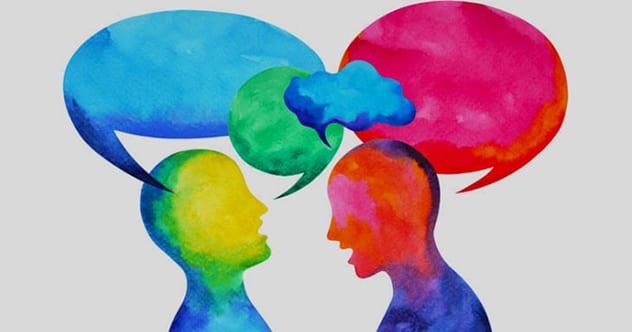The ability to talk also comes with mysterious moments. Why do authors have the ability to hear their fictional characters speak? Does language really predict a breakup three months before the relationship crumbles? Delve into these and more odd gems about talking! 10 Odd Scientific Facts About Emotions
10 Most People Talk Too Much
Humans are hardwired to read social cues from others. But when it comes to one thing—when to stop talking—a lot of people flounder badly. In other words, they cannot read the signs that the conversation is over. This chatty cluelessness produced interesting results in the laboratory. Several pairs of volunteers were asked to talk to each other. When questioned afterwards, nearly 70 percent confessed that they felt their partner had dragged the conversation on for too long. The reason for this became clear when the participants were also asked to guess when their partner had wanted to stop talking. Most of them grossly overestimated the time the other person wanted to engage with them.
9 Talking To Yourself Is Healthy
There is always that one guy standing in the corner mumbling to himself. He has to be a fruitcake because he is referring to himself in the third-person. But a study in 2017 showed that the Fruit Corner Guy might just have better coping skills than the rest. Michigan State Univerity hooked 89 volunteers up to various brain-reading devices and then zinged them with upsetting images or memories. As instructed, the slightly-traumatized participants then talked to themselves. Some questioned themselves in a first-person way (why am I upset) while others used the third-person. For example, someone called John Smith would say, “Why is John Smith upset?” Those who comforted themselves in the third-person experienced something remarkable. Their brains dumped the overload of emotions within a second. Apparently, talking to oneself as if you are another person puts a little distance between you and the problem. This gives the brain more resilience against stressful emotions, which leads to better coping skills in a difficult situation.
8 Small Talk Is Useless And Essential
A casual chat does not provide any real information. In this sense, small talk is useless. But as it turns out, that awkward conversation about the weather with a total stranger plays an important role in human relationships. It does not matter if the other person is a stranger, co-worker or a family member. Small talk cements a link with them. These links identify social roles, re-affirm friendships, and also keeps things friendly with strangers. From a survival point of view—during ancient times and perhaps even today—small talk is essential to bond with others in a positive way. Indeed, it could help to avoid a new enemy or a bad situation.
7 Eavesdroppers Find Eavesdropping Annoying
When it comes to being forced to listen to somebody’s phone conversation, that is. In 2013, researchers tricked volunteers. The latter believed that they were part of an experiment involving anagrams (the reshuffling of letters to reveal a different word or phrase). But the real experiment was a person who just “happened” to be standing nearby and talking on a cellphone. The volunteers got an earful of half a conversation. They were more distracted by this than when two people also “happened” to talk nearby. The full conversation did not attract nearly as much attention. As it turns out, hearing a one-sided discussion frustrates the brain. It desperately wants things to make sense. Not being able to follow a conversation highjacks the brain’s attention which is why eavesdropping, in this case, can be both hypnotic and annoying.
6 Huh Appears To Be Universal
English speakers are familiar with the word “Huh?” It shows confusion and that the listener needs more clarity from the speaker. This process is called conversation repair. Something confusing is said. The other person goes “Huh?” and after an explanation, the conversation is repaired and continues. Nearly every culture in the world practices conversation repair. But the most inexplicable thing about this is that a surprising number of languages use a sound that is similar or identical to the English word “Huh.”
5 Older People Share Fewer Memories
Although the reason is not clear, some people are less inclined to talk about past experiences as they grow older. When they do share a memory, older adults describe it with fewer details compared to a younger person. This nugget was discovered when scientists eavesdropped on 102 elderly citizens. The golden group knew that they were being monitored through a phone app. However, they were never told at what times the scientists would be listening. They were also not told what the study was really about (to see how often the volunteers spontaneously talked about their past). The age of the volunteers ranged from 65 to 90. After four days of snooping, the scientists started to notice a trend. The older individuals in the group talked less about their memories and when they did, they were less forthcoming with the details than the younger participants. It is plausible that age-related changes in the brain can be responsible. At the moment, though, there is no real evidence to prove that theory.
4 Language Determines Experience With Colour
The eye can see millions of shades but how people perceive those colours are affected by the language that they speak. This is because the brain views things in a way that makes sense or has meaning. Sense and meaning are, in turn, affected by the culture a person was raised in. While most nations have plenty of words for colours, some have just a few. Others, like Australia’s Warlpiri people, have none. Instead, they experience colours in their language by describing them with textures, purpose, and physical sensations. The Dani from Papua New Guinea also just describe colours as either dark and light (and at other times as cold and warm).
3 Sleep-Talk Is Mostly Negative
In 2018, scientists lulled patients to sleep in a laboratory. After eavesdropping on several dreamy dialogues, the results were in. Most of the sleep-talk was nonsense. It did not mean anything. Some people even laughed in their sleep. But then there were the true sleep-talkers who made sense and spoke using grammatically correct language. Curiously, the majority of the utterances were negative. When compared to the average statistics of people who talk when they are awake, the sleepers said “No” four times more often. Some even became aggressive or used abusive language. Indeed, F-bombs appeared to be a favourite word. It appeared 800 times more on the sleepers’ lips than in the waking world. The crabby behaviour is mysterious but one theory could explain it. If correct, as the theory argues, dreams are natural simulations that prepare people for real-life confrontations, fears, and dangers.
2 Language Predicts Break-Ups
For some reason, researchers wanted to discover if language could predict a doomed couple. And not just with something as obvious as arguments of discussing a break-up. Instead, the study trawled through a million online posts to find a hidden way that words might indicate that the honeymoon is over. Remarkably, the posts showed a slight change between couples. It popped up as early as 3 months before a break-up and even the person who eventually got dumped started to do it. The most common shift involved pronouns. People started to abandon couple-related words like “us,” “our” or “we,” for self-focused words like “I,” “mine,” and “me.” Curiously it did not matter what topic they were posting about. The pronoun shift was everywhere.
1 Authors Hear Their Characters’ Voices
Writers often become deeply involved in the fictional world of their novel. But it was not until 2020, when researchers cornered close to 200 authors, that a surprising fact was discovered. Moreover, a phenomenon that occurs between writers and their characters. The survey found that over 60 percent of the wordsmiths could “hear” their characters talk and 15 percent could join the conversation as naturally as if they were talking to real people. The writers could even distinguish speech patterns that were unique to each character. But the real surprise was the way that the fictional crowd behaved. Most of the authors encountered characters that acted as if they had free will. They did and said things the writer never planned. The study ruled out hallucinations and imaginary friends which left no explanation for the strange independence of the characters. However, researchers suspect that it has something to do with an unknown process involving the subconscious minds of writers. Top 10 Lesser-Known But Important Human Senses Read More: Facebook Smashwords HubPages
























